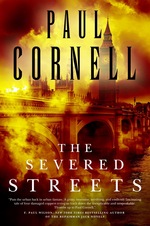Update: A representative of Audible.com, emailed me to ask if I’d like to post a clip from the audio book with this review. Sounded like a good idea to me (no pun intended). The sample’s at the bottom of this post, give it a listen.
by Paul Cornell
Hardcover, 416 pg.
Tor Books, 2014
Read: June 11 – 14, 2014
This Cornell guy can write.
I’m tempted to let that be all I say about this book. Won’t be (because I can’t help myself), but it’s tempting. The other thing I’m tempted to do is copy and paste the first three paragraphs of my London Falling review to start this one — I am a little annoyed to see that I spoke so much about the Bryant & May Peculiar Crimes Unit series last time, because the comparison really hit me repeatedly as I read this book. I hope neither Cornell or Fowler mind that comparison.
Straightaway, Cornell creates a world rich with atmosphere — the his depiction of the tension on the streets of London is visceral, and then when the first murder occurs, you start to wish for something a little less visceral. And that’s in the first handful of pages. Once the focus turns to the team of detectives, it takes almost no time at all to immerse yourself again in this world (one that I honestly was a little fuzzy on when I picked up the book, remembering everything about these characters took a page or two back with them). There’s a bit more esprit de corps amongst them now then when we left them in London Falling, they’ve spent more time together, are more familiar with each other — and, if nothing else, realize that they share something that no one else in the London Police does.
Now they’ve got their hands full, seeking a vicious killer that only they can see. One that seems to have connections to a popular protest movement (think the Occupy movement, but with masks) and maybe to Jack the Ripper. Add all those things together, and you’ve got yourself a real mess. To that, add multiple conflicting goals on the part of Quill and his team, a looming police strike, an overly-inquisitive media mogul, a meddling Security Service, and a city on the verge of riot — and you’ve got, well, I don’t know exactly what it is, but the word “mess” no longer can describe it.
This early in a series, I don’t have any strong emotional connection to characters — particularly in this series, which (to me) seems to lend itself to a distancing between reader and character. But when one of the team makes an unthinkable sacrifice, I realized that distance didn’t exist anymore for me, and I had to put the book down for a brief moment to think about what I’d just read. But I couldn’t keep it down for long and had to pick it up quickly — only to be hit with something worse not that long after.
Which is not to say that this whole novel is an emotional wringer, there’s more humor, more hope intrinsic to this book than its predecessor, while it doesn’t lose any of it’s edge. The celebrity cameo was hilarious in a book not typified by hilarity of any kind. And then it became more than a cameo, which was pretty cool — and then it became, brilliant. I mean, truly brilliant. And I really can’t say more about it than that without violating all sorts of my spoiler policies.
I want to say more about this book, and maybe I’ll come back and revise this later, but for now I’d better leave it at this or it’ll never get done. The Severed Streets is one of those books that will make you want to cancel plans, so you can spend more time with it. From the unnervingly impossible assassination at the beginning to the truly disturbing final sentence, and almost every point in between, this is a killer book — gripping, suspenseful, with no punches pulled on any level. Please let there be more of these soon.
—–





